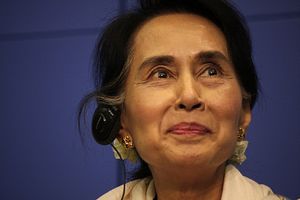The lengthy talks over the exact shape of Myanmar’s government, and the identity of its new president, are just the first signs that the country’s path to democracy may not be orthodox.
On November 11, democracy icon, Aung San Suu Kyi, received a congratulatory phone call from U.S. President Barack Obama, after her National League for Democracy party romped to victory in Myanmar’s national election.
But while Western powers rejoice, and though Suu Kyi’s has sewn the seeds for democracy in Myanmar, the ground remains infertile.
“The distinguishing mark of a universal value is not that it already enjoys universal acceptance,” said development economist Amartya Sen. “But, that people everywhere have reason to see it as valuable.”
Unfortunately the nation that the NLD inherits is far from adopting universal values, with interests Balkanized along economic, ethnic and political lines.
The country lacks the cross-cutting cleavages to allow democratic change to take off, such that democracy today may paradoxically destabilize Myanmar, by giving power to entrenched, divided and unequal interests.
Suu Kyi does not seek “abrupt changes,” and hopes to bring about a steady transition of rule from decades of military dominance.
On the economic front the NLD is likely to continue pushing the country along its path to greater liberalization.
Foreign direct investment rose to over $8 billion in the 2014/15 fiscal year, but much of the money remains concentrated in the country’s jade, oil and gas industries – tied to former generals.
Urban “elites” and large corporations under armed force control are most likely to benefit from increased liquidity as the country opens up further – while poverty is expected to remain high in the country’s largely rural and ethnically segregated provinces.
“[The number of ultra-high-net worth] individuals in Myanmar could grow by more than seven times in the next decade – the fastest such pace of growth anywhere,” said Wealth-X, a wealth intelligence consultancy.
If the rural and unlanded are unable to tap into the country’s economic fortunes – fenced out by rising elites – vast chasms in wealth will remain an obstacle to building the broad-based citizen coalitions necessary for an efficient democracy.
Though democracy may be a banner for freedom in the west, true freedom will not be possible in Myanmar unless people have the power to make economic choices.
Beyond economic division, rife ethnic and religious conflict is likely to inhibit the creation of a society with cross-cutting interests, especially as recent peace talks continue in the absence of representation from the most active ethnic rebel groups.
Anti-Islamic sentiment has been mercilessly stirred-up among the near 70 percent Bamar population – carried in part by radical Buddhist monk Wirathu’s 969 movement, a nationalistic organization.
The majority Bamar thus forms an overriding part of the electorate with little tying them to the ethnic groups in Myanmar’s border states – where mountainous geography to its north and west has facilitated the preservation of distinct ethnicities, and the more traversable Shan plateau terrain on its Thai border has facilitated restiveness.
For all the promise of a more democratic Myanmar, even politically it is shaping up to be a pseudo-authoritarian state – lacking the natural forces to be truly representative at all levels.
Facing weak opposition and an winning an overwhelming 80 percent of available seats, the NLD take power with Suu Kyi vowing to “make all the decisions,” despite being barred from taking presidential post by the same constitution that retains 25 percent of seats for the military.
But, with question marks over how the military exercises its power, the political environment that Suu Kyi inherits may ironically be just the stage necessary to develop the nation.
Without a somewhat dictating hand, the liberties that unrestrained democracy brings may translate into the freedom to subjugate, hate and divide. But, with Suu Kyi’s aura, she can attempt to carve out a unifying long-term vision for the country.
She must tame military influence, manage inefficient ministries and act as a mediator across all ethnic parties.
A centrally planned development with employment projects, infrastructure investments and social welfare enhancement may create an economy that truly binds the vested interest of its people, rich to poor, Bamar to non-Bamar. Only when these divides are bridged will true democracy take root.
Suu Kyi’s task may echo that of Lee Kuan Yew, Singapore’s founding father.
A small ethnically divided nation, Lee championed nationalism and prepared Singapore for the global free market in his role as a visionary authoritarian. Suu Kyi, with her own maternalistic style, now has the opportunity to guide Myanmar – to forge a national identity and to create inclusive and broad-based development as the country opens.
There is a balancing act in Myanmar, fighting for the short-term phantom of democracy today may just inhibit its long-term evolution.
And so, while Aung San Suu Kyi embodies “the spirit of democracy” – in reality, it may be her role as a benevolent single-handed ruler that guides Myanmar forward.
Tej Parikh is an international affairs journalist currently based in Southeast Asia. He recently received his master’s degree from Yale University, with a focus on state building, ethnic conflict and fragile states. He tweets at @tejparikh90. He has written for the Guardian, Reuters, The Cambodia Daily and Global Politics Magazine.

































